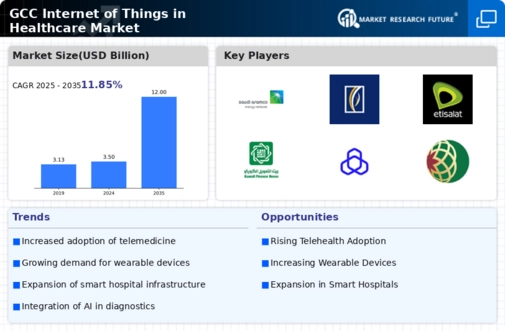Growing Focus on Preventive Healthcare
The growing focus on preventive healthcare is emerging as a key driver for the internet of-things-in-healthcare market. With rising healthcare costs and an aging population, there is a shift towards preventive measures that can mitigate health issues before they escalate. IoT devices enable continuous health monitoring, allowing individuals to track their health metrics and make informed decisions. This proactive approach is gaining traction in the GCC, where healthcare systems are increasingly emphasizing wellness and prevention. As a result, the internet of-things-in-healthcare market is likely to expand as more individuals and healthcare providers adopt IoT solutions for preventive care.
Rising Demand for Remote Healthcare Solutions
The internet of-things-in-healthcare market is experiencing a notable surge in demand for remote healthcare solutions across the GCC. This trend is driven by an increasing population that seeks convenient access to healthcare services. According to recent estimates, the GCC healthcare market is projected to reach approximately $104 billion by 2025, with a significant portion attributed to telehealth and remote monitoring solutions. The integration of IoT devices facilitates real-time health monitoring, enabling healthcare providers to deliver timely interventions. As patients become more health-conscious, the need for innovative solutions that allow for remote consultations and monitoring is likely to grow, thereby propelling the internet of-things-in-healthcare market forward.
Technological Advancements in Medical Devices
Technological advancements in medical devices are playing a crucial role in shaping the internet of-things-in-healthcare market. The introduction of smart medical devices equipped with IoT capabilities enhances patient care by enabling continuous monitoring and data collection. For instance, wearable devices that track vital signs can transmit data to healthcare providers, allowing for proactive management of chronic conditions. The GCC region is witnessing a rapid adoption of such technologies, with the market for connected medical devices expected to grow at a CAGR of over 25% in the coming years. This growth is indicative of the increasing reliance on technology to improve healthcare outcomes, thus driving the internet of-things-in-healthcare market.
Government Initiatives to Promote Digital Health
Government initiatives aimed at promoting digital health are significantly influencing the internet of-things-in-healthcare market in the GCC. Various governments are investing in digital health strategies to enhance healthcare delivery and improve patient outcomes. For example, initiatives such as the UAE's National Strategy for Artificial Intelligence aim to integrate advanced technologies into healthcare systems. These efforts are likely to foster an environment conducive to the growth of IoT applications in healthcare. As governments allocate funding and resources to support digital health initiatives, the internet of-things-in-healthcare market is expected to benefit from increased investment and innovation.
Increased Investment in Healthcare Infrastructure
Increased investment in healthcare infrastructure across the GCC is a significant driver of the internet of-things-in-healthcare market. Governments and private entities are channeling substantial funds into modernizing healthcare facilities and integrating advanced technologies. This investment is aimed at enhancing the quality of care and improving operational efficiency. For instance, the GCC healthcare market is projected to grow at a CAGR of around 10% from 2025 to 2030, reflecting the commitment to developing robust healthcare systems. As healthcare infrastructure evolves, the adoption of IoT solutions is likely to accelerate, thereby propelling the internet of-things-in-healthcare market.
















